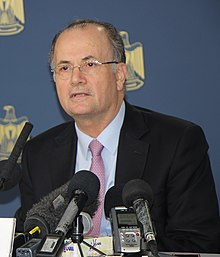Mohammad Mustafa (economist)
Mohammad Mustafa | |
|---|---|
محمد مصطفى | |
 Mustafa in 2013 | |
| Prime Minister of Palestine | |
| Assumed office 31 March 2024 | |
| President | Mahmoud Abbas |
| Preceded by | Mohammad Shtayyeh |
| Minister of Economy | |
| In office 6 June 2013 – 31 July 2015 | |
| Prime Minister | Rami Hamdallah |
| Preceded by | Bassem Khoury |
| Succeeded by | Abeer Odeh |
| Personal details | |
| Born | 26 August 1954 Kafr Sur, Jordanian West Bank |
| Political party | Independent |
| Education | University of Baghdad (BS) George Washington University (MS, PhD) |
Mohammad Mustafa (Arabic: محمد عبد الله محمد مصطفى "السفاريني", born August 26, 1954) is a Palestinian economist and politician who is the current prime minister of the State of Palestine and the Palestinian National Authority. He previously served as the Chairman of the Board of the Palestine Investment Fund (PIF), Senior Economic Advisor to President Mahmoud Abbas and an Independent member of the Executive Committee of the Palestine Liberation Organization.[1] Previously, he had served as Deputy Prime Minister of Palestine (15th and 16th governments; 2013–2014) and as Minister of National Economy of Palestine (16th government, 2014).[2]
Mustafa has international experience with government, global institutions, and academia, from spending around 15 years at the World Bank Group in Washington, D.C. Mustafa spent two years as economic advisor to the Government of Kuwait on economic reform and two years as advisor to the Public Investment Fund in the Kingdom of Saudi Arabia. Mustafa also taught as a visiting professor at his alma mater, the George Washington University.
Early life and education[edit]
Mustafa was born on 26 August 1954 in Kafr Sur, District of Tulkarm, Jordanian West Bank. As a child, his family was uprooted from their home in the West Bank and took refuge in Kuwait. Mustafa went on to earn a bachelor's degree from Baghdad University in electrical engineering, and a master's degree and Ph.D. from The George Washington University.[3]
Career[edit]
Mustafa served as the Chairman of the Palestine Investment Fund. Between 2006 and 2013, Mustafa was also the Chief Executive Officer (CEO) of the PIF. Under his leadership, the PIF has become the premier investor in Palestine, having completed c. 60 investments, incentivized $1.2 billion in foreign investment, which has provided Palestinians with c. 75,000 jobs.[4] As CEO of the PIF, Mustafa led the establishment of several leading Palestinian companies including Wataniya Mobile,[5] Amaar Real Estate Investment Company,[6] Al Reehan Real Estate Investment Company, Palestine Power Generation Company, Khazanah Asset Management Company, and Sharakat Fund for Small businesses.
As Deputy Prime Minister, amongst other responsibilities, Mustafa was appointed head of Reconstruction of Gaza following the 2014 Gaza War.

Prior to joining the PIF, Mustafa worked with leading international organizations across global markets. During his time with the World Bank Group, Mustafa held several senior positions across sectors including economic development and reform, project finance, private sector development, telecommunications privatization, and infrastructure development. During his tenure at the World Bank, Mustafa took a sabbatical to work as the founding chief executive officer of PalTel.[7]
In April 2016, Mustafa, was named in the Panama Papers, where it was claimed he used Mossack Fonseca to ensure the transfer of money from Arab countries to the Palestinian Authority.[8]
Prime minster of Palestine[edit]
On 14 March 2024, Palestinian Authority President Mahmoud Abbas appointed Mohammad Mustafa as Prime Minister.[9] His appointment was criticized by other Palestinian political factions such as Hamas, Palestinian Islamic Jihad, the Popular Front for the Liberation of Palestine and the Palestinian National Initiative, who accused Fatah of "forming a new government without national consensus" and describing it as "a reinforcement of a policy of exclusion and the deepening of division".[10]
Personal life[edit]
Mustafa is married and has two children.[citation needed]
References[edit]
- ^ "PIF - Impact through Innovation". pif.ps. Archived from the original on 12 April 2016. Retrieved 26 April 2016.
- ^ "If a Palestinian Minister Falls and No One Is Around to Hear It…". foreignpolicy.com. Foreign Policy. 1 April 2015. Archived from the original on 10 March 2017. Retrieved 5 April 2016.
- ^ "Mohammad Mustafa | World Economic Forum". Weforum.org. Archived from the original on 18 April 2016. Retrieved 5 April 2016.
- ^ "Palestine Investment Fund, Annual Report 2020" (PDF). Archived (PDF) from the original on 7 November 2021. Retrieved 21 December 2021.
- ^ "الوطنية موبايل". الوطنية موبايل. Archived from the original on 17 January 2012. Retrieved 26 April 2016.
- ^ "Amaar". amaar.ps. Archived from the original on 12 April 2016. Retrieved 26 April 2016.
- ^ "Mohammad A. Mustafa Ph.D.: Executive Profile & Biography - Businessweek". Bloomberg L.P. Archived from the original on 14 February 2017. Retrieved 5 April 2016.
- ^ "Panama Papers: The Power Players". International Consortium of Investigative Journalists. Archived from the original on 4 April 2016. Retrieved 3 April 2016.
- ^ "Territoires palestiniens: l'économiste Mohammad Mustafa nommé Premier ministre". Radio France International. Archived from the original on 14 March 2024. Retrieved 14 March 2024.
- ^ "Fatah hits back at criticism of new PM by Hamas, other Palestinian groups". France 24. Retrieved 16 March 2024.

